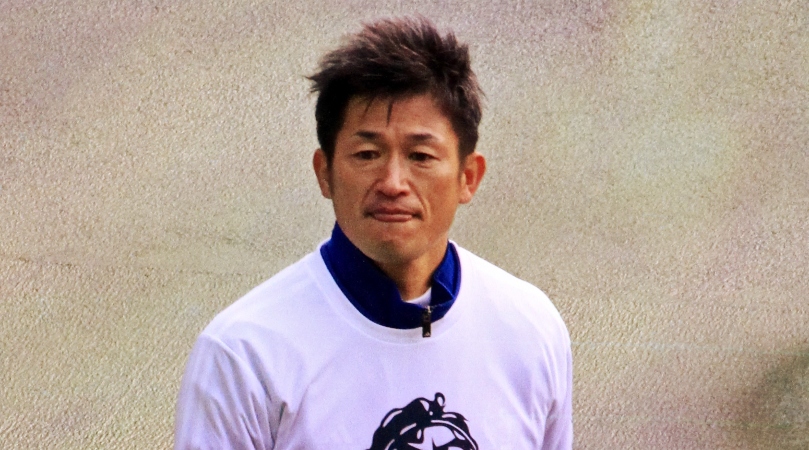Football
Kazuyoshi Miura: The remarkable story of the longest playing footballer in history
Japanese footballers? The names that come to mind could be counted on the fingers of one hand. Yet there is one who is regularly featured in newspapers around the world. That’s Kazuyoshi Miura, captain of Yokohama FC.

Japanese footballers? The names that come to mind could be counted on the fingers of one hand. Yet there is one who is regularly featured in newspapers around the world. That’s Kazuyoshi Miura, captain of Yokohama FC. And what makes this professional footballer so interesting? For example, he celebrated his 54th birthday this year and is still actively playing.
In the world of sports, that’s unprecedented. A footballer who has been at the professional level for almost four decades. His repeated contract extensions are fascinating. Miura is the oldest scorer of a competitive goal in a professional match in the world and the longest playing professional footballer.
Who is “King Kazu” and how can he still play? How is it possible that his career is at least fifteen years longer than average?
The whole story began at the 1970 World Cup in Mexico, where his father went to watch football matches.
“My father was in Mexico in 1970 to watch the World Cup. He filmed all the matches with an 8mm camera. At that time, Pelé was playing for Brazil. I grew up watching the videos my father made,” Miura told the BBC.
Miura was only three years old at the time, but the videos already had a huge impact on him.
“I became a fan of Brazilian football. Ever since I was a little kid, I wanted to be a professional player.”
His father was close to Brazil, so Miura decided to relocate to Brazil at the age of 15, where he signed for professional outfit Juventus in São Paulo. But the start was rough, and Miura spoke almost no Portuguese.
“At that time there was no professional league in Japan like the J-league today, it was only created in 1993. So there was no chance of me becoming a professional football player in Japan.”
Miura was determined to improve. He attended many training sessions, learned Portuguese, and made friends. When reporters asked him what he would do if football didn’t work out, he replied, ” I have no idea. All I ever wanted to be was a professional footballer. This is the hardest question for me.”
Three years after he left for Brazil, in 1986, he signed for Santos, where his father’s video star, Pelé, used to play. In Brazil, he then switched several more clubs.
In 1990, he returned to Japan as a hero. He was named the most expensive player in the league, surpassing even Gary Lineker, who at the time was playing for rival Nagoya Grampus.
Four years later, Miura moved again, this time to Genoa, and became the first Japanese player in Serie A. However, he had to undergo surgery immediately after his first game after a collision with Baresi. He ended up staying in Italy for only one season, scoring one goal.
“Miura is intrinsically linked to the start and development of professional football in Japan. He has earned god-like status here, much like Diego Maradona in Argentina,” Sean Carroll, a football journalist based in Japan, once wrote.
“We have a whole generation of professional players here, maybe even two, who saw him as their role model when they were kids,” Caroll continued.
But how is it possible that Miura is still playing?
At the age of 38 (in 2008), Miura signed with his current club, Yokohama FC, then playing in Japan’s second league. He became a key player and won promotion to the first league with the team.
Although Yokohama was relegated back to the second league after one season, Miura continued to play regularly for the team. For example, in 2016 alone, he played twenty games and scored two goals. For the record, he was 49 years old at the time.
Miura is almost never injured, it happens only rarely. His fitness regime and healthy lifestyle is admired by people all over the world.
“Of course it takes me longer to recover than younger players. But even though it’s very difficult, I still have the passion and desire to play and that’s what drives me forward.”
Another reason Miura’s career is still going strong is his popularity. Kazu is a very friendly and kind person. Alan Gibson, editor of J soccer magazine, has had the privilege of whistling a few games in which Miura has played. That was when he was still playing for Vissel Kobe around 2000.
“He was a real gentleman on the pitch. I really enjoyed whistling games for him,” Gibson said.
Everyone loved him. Even though he’s a king, he’s never played in a World Cup. But in his native Japan, he can enjoy great admiration. Because of his popularity, more people watch Yokohama games. When Miura plays, three to four thousand more people watch. All this, of course, attracts sponsors.
Which brings us to another reason for his long career. People have grown accustomed to him over that time and everyone wants to see the world’s longest playing professional footballer.
One of the coaches once said of Miura: “Kazu is a kind of ‘panda bear’ for the people of Yokohama, a rare and beloved curiosity rather than a serious player.
Miura played four games last season and didn’t score. This season he has played one game so far, also without a goal.
But Sean Carroll thinks Miura’s experience is terribly important in the Yokohama locker room and a lot of players can learn a lot from him. “Hierarchy is extremely important in Japan. Miura is a role model and ideal for many people. His hard work and dedication comes back to him in the form of the support he receives from the fans. As a person, he is proof that anything is possible if you want it.”
Journalists often ask Miura what the secret to his long career is. He insists there is no secret behind it other than hard work and dedication.
And how does Miura, who trains every day in Yokohama, enjoy playing football today? Does he enjoy it as much as the 15-year-old boy who flew to Brazil many years ago with a little Portuguese vocabulary learned and a head full of dreams?
“Yes, I still enjoy playing football. Every moment. I really enjoy it, even more than when I was playing in Brazil,” he ended the interview.
Source: BBC, Wikipedia, Transfermarkt, Diario AS




